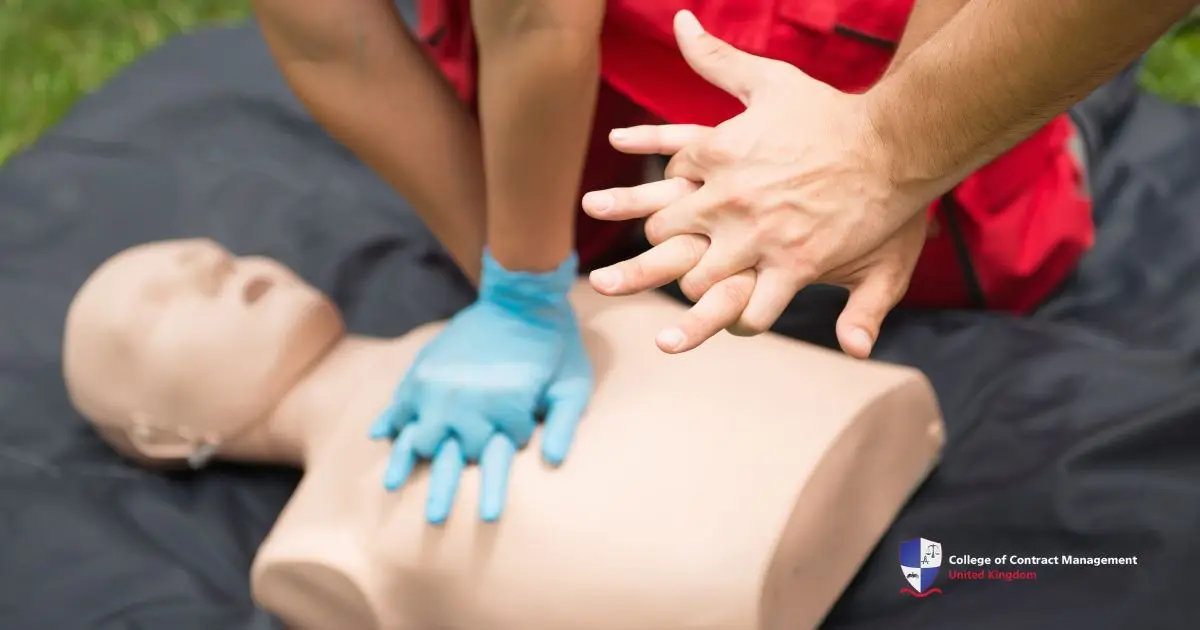In the ever-changing world of healthcare, having a good mix of skills is important for moving up in your career. So, one crucial skill that can enhance your job opportunities is obtaining a first aid certification. taking a first aid courses gives you the know-how to handle medical emergencies. As a result, it makes you a great asset in different healthcare roles.
With first aid training, you become a more valuable team member in different healthcare roles. Additionally, this skill helps you feel more capable and makes you more appealing to employers looking for qualified candidates. So here's everything you need to know about first aid courses.
The importance of First Aid in Healthcare
First aid courses teach valuable skills that are useful in many situations, from home to workplaces. Here are some important benefits of taking a first aid course, including how it can help you feel more confident in emergencies:
- Emergency Preparedness: Learn how to respond to emergencies confidently and competently.
- Increased Employability: Stand out to potential employers by showcasing your first aid courses certification on your CV.
- Enhanced Patient Safety: Contribute to a safer environment for patients and colleagues by being prepared for medical emergencies.
- Improved Teamwork: Develop the ability to collaborate effectively with other healthcare professionals during emergencies.
- Confidence Building: Gain the confidence to act quickly and efficiently in emergencies, which can save lives.
In healthcare, emergencies can arise unexpectedly, and having the skills to address these situations can be the difference between life and death.
Areas where First Aid courses are beneficial
First aid courses are applicable across different sectors within healthcare. So, let’s explore two primary areas where it can significantly impact adult care and health and social care.
Adult Care
In the adult care sector, first aid courses are vital. Caregivers often encounter situations requiring immediate medical attention. So here’s how these courses are applicable in adult care:
- Administering Basic Life Support (BLS): Knowing CPR is really important for anyone taking care of elderly patients. When someone has a cardiac arrest, every second counts. Being able to do CPR can make a big difference and might even save a life.
- Managing Falls: Learning how to handle injuries from falls can make a big difference in recovery and help avoid complications. Falls happen a lot among older adults. For this reason, being able to assess injuries can lead to better results.
- Recognising Medical Emergencies: Being aware on how to spot signs of strokes, heart attacks, or other emergencies can make a difference. So, by recognising the symptoms and acting quickly, you can help save lives.
Examples of First Aid situations in Adult Care
- Heart Attack: If an elderly is having chest pain or trouble breathing, it's important to notice it and act quickly. This can really help their health. You can learn how to respond to these situations in first aid courses.
- Stroke: The FAST method is a simple way for caregivers to check for signs of a stroke. It stands for Face, Arms, Speech, and Time. By remembering this method, medical assistants can easily spot potential stroke symptoms and make sure the person gets the help they need right away.
Health and Social Care
In health and social care, professionals regularly interact with vulnerable populations. Because of this, first aid courses enhance your ability to provide quality care:
- Handling Medical Emergencies: It's important to be ready for situations like asthma attacks, allergic reactions, or diabetic emergencies so that patients can get the help they need right away. For example, knowing how to use an EpiPen is really crucial for people with serious allergies.
- Supporting Mental Health: First aid courses often include topics on mental health, teaching professionals how to help people in crisis. It's important to know how to handle these situations.
- Enhancing Communication Skills: Speaking clearly during emergencies helps you connect better with patients and their families. Staying calm can help ease their worries when things get tough.
Examples of First Aid situations in Health and Social Care
- Anaphylactic Shock: Recognising the signs and symptoms of anaphylaxis and knowing how to use an EpiPen can save a life.
- Mental Health Crisis: Using de-escalation skills from mental health first aid can make a big difference for people in distress, helping them feel supported and understood.
First Aid courses to consider
If you want to enjoy the benefits of first aid courses, think about signing up for one of the courses listed below. Learning basic first aid can help you feel more composed in emergencies and ensure you're ready to assist when needed:
- Basic First Aid Course: Covers essential skills like CPR, wound care, and how to handle common medical emergencies.
- Paediatric First Aid Course: These first aid courses focus on how to handle emergencies involving children and infants. They are really important for anyone who works with kids, like teachers, daycare staff, or family support workers.
- Mental Health First Aid Course: Teaches how to identify and assist individuals experiencing mental health crises. As a result, it is crucial for those in social care roles. So this training is essential for fostering a supportive environment for clients struggling with mental health issues.
- Advanced First Aid Course: Delves deeper into complex emergency scenarios which is ideal for those in supervisory roles in healthcare settings. Additionally, it covers advanced techniques for handling emergencies and preparing individuals for high-stress situations.
First aid courses aren't just for healthcare workers but also important in industries like construction. These courses teach basic skills like CPR and wound care, helping you respond to emergencies and keep others safe.
First Aid and Safety courses in Safety Construction
In construction, keeping everyone safe is really important to avoid accidents. For this reason, first aid courses help you learn how to handle emergencies and keep the workplace secure. Here are some other courses you might want to check out:
- Health and Safety in Construction: The Health and Safety in Construction course teaches you important skills like spotting risks. As well as using equipment safely and knowing fire safety rules to keep job sites safe. Because of this, when you finish the course, you'll get a valuable safety certification.
- CPD (Continuing Professional Development) Health and Safety Course: This course keeps construction workers up to speed on the latest safety tips and ways to grow in their careers. Also, it counts for CPD hours to boost your professional profile.
- CDM (Construction Design and Management): This programme gives you important information on how to handle health and safety in construction projects from start to finish. It explains what you need to know about CDM regulations to stay compliant and helps you promote safer work practises at every stage of construction.
Choosing the right course
When selecting first aid courses, consider your specific career goals and the population you will work with. So here are some tips in choosing the right path for you:
- Assess Your Current Role: First, determine which first aid courses are most relevant to your current job and future aspirations.
- Look for Accreditation: Second, ensure the course is accredited and recognised by industry standards to enhance your employability.
- Consider Duration and Format: Lastly, choose a course that fits your schedule, whether it’s a one-day workshop or a longer course spread over several weeks.
Personal and Professional growth with the College of Contract Management
The College of Contract Management helps people kickstart and grow their careers in healthcare with first aid courses. We offer support by providing essential training, making it easier for you to gain the skills needed for this vital field. Whether you're just starting or looking to advance, they are here to guide you every step of the way.
- Tailored Courses: The college offers variety of classes, including first aid, to help you reach your career goals. These courses are designed to be student-friendly and follow the standards used in the industry.
- Career Guidance: Expert advisors offer helpful advice on using skills like first aid to improve your job prospects. Their support can make it easier for you to find your way in your career.
- Networking Opportunities: It's a great chance to meet people in your industry. Making connections can lead to job opportunities and mentorship. Taking first aid courses will help you build your network and open up new and exciting paths for your career.
- Flexible Learning Options: The College offers online and in-person classes, making it easier to fit your education into your busy life. This flexibility helps you balance your studies with work and other responsibilities.
Student Support Services
In addition to the courses offered, they also provide various support services for students:
- Tutoring and Mentoring: Students can access tutoring and mentoring services for additional help with course material.
- Career Services: The college offers resources for resume writing, interview preparation, and job search strategies besides first aid courses.
- Alumni Network: You can join a community of successful graduates who can offer guidance and support throughout your career.
Conclusion
First aid courses are more than just certificates; they are important tools that can help you in your healthcare career. Taking these courses can keep patients safe, make you more attractive to employers, and help create a positive workplace in areas like adult care and health services. The College of Contract Management is here to support you on this path by offering resources and assistance to help you succeed.
Taking such trainings is a great way to kickstart your healthcare career. It helps you feel ready to handle emergencies with confidence. By signing up for these courses and getting support from the College of Contract Management, you set yourself up for career growth while making a real difference in people's lives.
Don’t wait any longer—sign up for a first aid course today and open up new job opportunities! The skills you learn will not only boost your resume but also help you make a real difference in emergencies. This can lead to a more rewarding career in healthcare.





